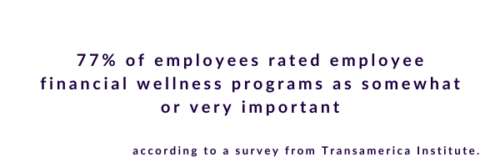Financial resiliency: The skill you didn’t know your team needed. Learn why fostering financial resiliency may be key to a more productive, confident workforce.
Everyone encounters rough financial patches at some point — the key is how easily you adapt to situations that threaten your well-being. This concept is at the core of financial resiliency, the key skill you could be missing in your workforce.
What is Financial Resiliency?
Financial resiliency refers to a person’s ability to withstand life events that impact their income, assets, or overall financial wellness. Divorce, sudden medical issues and unemployment can throw a wrench into a person’s finances. However, the right tools and support can help employees build financial resiliency and weather any storm.
Employees often look to their employer as a source of financial wellness support. In a survey of nearly 2,000 employees conducted by Transamerica Institute, seventy-seven percent of respondents rated employee financial wellness programs as somewhat or very important. Yet only 28% of employers report offering such benefits to their teams.
How You Can Build Financial Resiliency
Supporting employee financial resiliency can help companies dial down employee financial stress and accelerate the path to financial security. Learn more about the unique benefits of a financially resilient team. Plus, learn to build resiliency among your organization at large.

For employers, we offer an unparalleled level of customization and curation out–of-the-box, the ability to build in your own benefits, grouped for specific portions of your workforce, as well as analytics that would be difficult to get anywhere else.
Learn How Best Money Moves Builds Financial Resiliency
Today, around 1,000 companies trust Best Money Moves with their employees’ financial wellbeing. What I’ve learned is that when employees feel less financial stress, there’s a real ROI for employers: Less chronic illness and addiction issues, fewer heart attacks, better health outcomes, sure. Also, less turnover and more focused, productive employees. Their employees feel happier and sleep better. Bonus: They’re less grouchy, too.
Since Black and Brown families have about one-tenth the wealth of White families, we’ve found creative ways to work with nonprofits, religious organizations, colleges and universities, local governments and for-profit companies enmeshed in those communities. We’ve developed give-back programs to help fund their initiatives. We’ve created special versions of Best Money Moves, which we call “Pro,” to cater to micro-businesses and start-ups packed with partnerships that we believe will resonate with those employers and their employees. And, we work to make sure everyone who needs access to Best Money Moves has it.
Employers Need Help Building Workforce Financial Resiliency
The feedback, testimonials, and ratings we’ve received make it all worthwhile. We are helping people make smarter decisions with their money everyday. Which is enormously gratifying. Less so is the hard work we’ve done over the past eight years to educate employers on the very real benefits of a less financially-stressed workforce.
Financial stress is the #1 reported workplace stress. Financial wellness has been the #1 requested benefit for the past few years. We must all look for ways to turn down the volume on our highly stressed workforce and find opportunities to help our employees feel better about themselves, their earning potential and their financial futures.
Create a Better Financial Future for Your Employees
I have a few people I’d like to thank starting with our incredible Best Money Moves team, who make us look good every day, my family for all their support, and in particular, I’d like to thank my husband, Sam, who always believes my wildest dreams will come true.
In closing, I’d like to leave you with a quote from the late Herb Kelleher, co-founder, CEO and Chairman Emeritus of Southwest Airlines until his death in 2019: Your employees come first. And if you treat your employees right, guess what? Your customers come back, and that makes your shareholders happy. Start with your employees and the rest follows from that.
Thank you.

